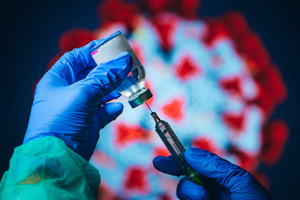Why you should #MatchMyJab
No-one is safe until we are all safe.
As the COVID-19 vaccine roll out begins in Australia, as well some other fortunate and select countries across the world, for many there is a sense of relief that this intensely anticipated milestone which is considered symbolic of the beginning of the end to the pandemic, has finally arrived.
It may be no surprise that countries at the front of the queue are those which could afford to invest significantly in vaccine development or directly to buy up large supplies, alongside a small number which have benefited from ‘vaccine diplomacy’. However, for many low and middle income countries (LMICs) which have not been able to place themselves in the same financial and political advantageous positions, the vaccine may remain out of reach for some time to come. Millions of people continue to live under tough restrictions, uncertain as to when they will end. Others, driven by their own economic survival, are having to ‘get on with living now’ which may be further intensifying the spread of the virus.
Everyone deserves – and must have – a shot
There is an obvious ethical obligation to do what we can to ensure everyone has access to a COVID-19 vaccine - there are fears that many lower income countries will not have enough stock to inoculate key populations, including their healthcare workers, elderly populations and high risk groups, this year, next or even the one after.

But it is not just about fairness – let’s consider the public health imperative. By allowing the virus to thrive unabated in some countries, COVID-19 will keep mutating and migrating, potentially leading to a multitude of highly infectious, even vaccine-resistant strains. These new strains could be harder to manage or treat, and possibly compromise the effectiveness of the vaccines that we are currently pinning our hopes on. This overall would then limit the extent to which public health restrictions can be eased, anywhere. In simple terms, we will only truly be making progress against combatting and controlling this virus when all parts of the world get to high levels of vaccination.
If we don’t get to this point, then the global economic cost would also be vast. High income countries are hugely economically dependent on low-income countries due to global trade links - economic slowdown in poorer nations caused by pandemic restrictions will have a knock-on effect across the world. A recent report has suggested that failure to vaccinate lower income nations would cost the global economy up to US$9.2 trillion, with half of that cost falling on wealthy nations.1
The opportunity of COVAX
This critical gap in access to COVID-19 vaccines for low and some middle income countries can be addressed through COVAX, a global collaboration led by the World Health Organization, the Coalition for Epidemic Preparedness Innovations and the Gavi Vaccine Alliance. The initiative is looking to provide 2 billion doses of vaccines worldwide, including 1.8 billion doses to 92 eligible lower income countries that may not otherwise be able to afford or access the vaccines.
So far, more than US$8 billion has been pledged to support the work of COVAX from a mix of governments, multilateral organisations and private industry. This includes a recent commitment of US$2.5 billion made by the Biden administration (the single largest commitment to COVAX from any one source). The first doses distributed through COVAX landed in Ghana in February. Since then almost 30 million doses have been delivered to more than 50 countries.
However, COVAX is currently facing a US$3.2 billion gap and under current plans, the scheme only aims to cover 20-27% of eligible country’s populations this year, which will likely not be enough to protect all key and vulnerable groups, as well as effectively limit transmission. For many countries, the timelines for delivery of vaccines are also still uncertain with concerns that some countries may not get widespread coverage even by 2023, if at all.
Essentially, if COVAX doesn’t get vaccines out fast enough, the globe will remain in the grip of pandemic for the foreseeable future.
What can you do?
To address this critical funding gap, COVAX needs your support and now.
If you’ve already had your free COVID-19 vaccination, or at least have the assurance of knowing it is on its way, please #MatchMyJab by matching the cost of your vaccination with a donation.
Are you ready to do what can you to spread the word? Share your vaccination on Social Media and include #MatchMyJab. Together we can ensure all people at risk, no matter how wealthy their country, have access to the vaccine.
1 Çakmaklı CC, Demiralp S¸ Kalemli-Ozcan Ş, et al. The economic case for global vaccinations: an epidemiological model with international production networks. 25 Jan 2021.https://iccwbo.org/publication/the-economic-case-for-global-vaccinations.